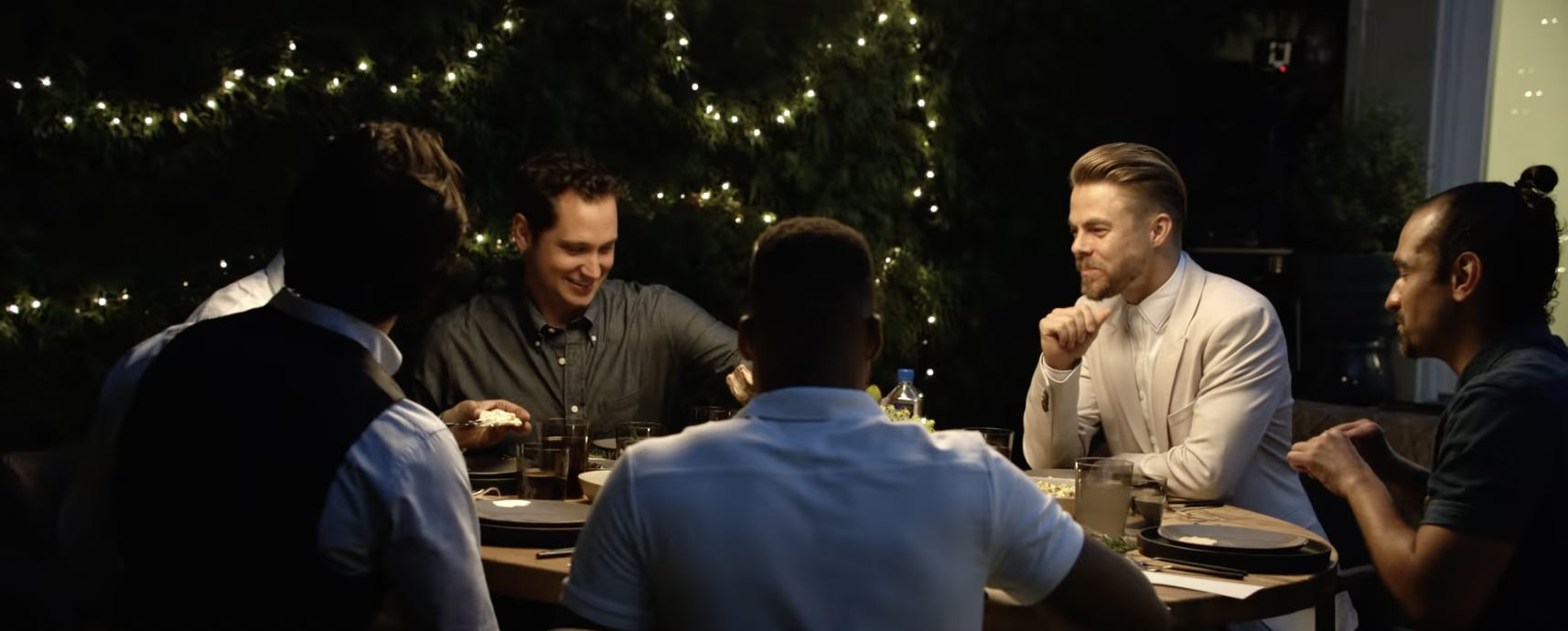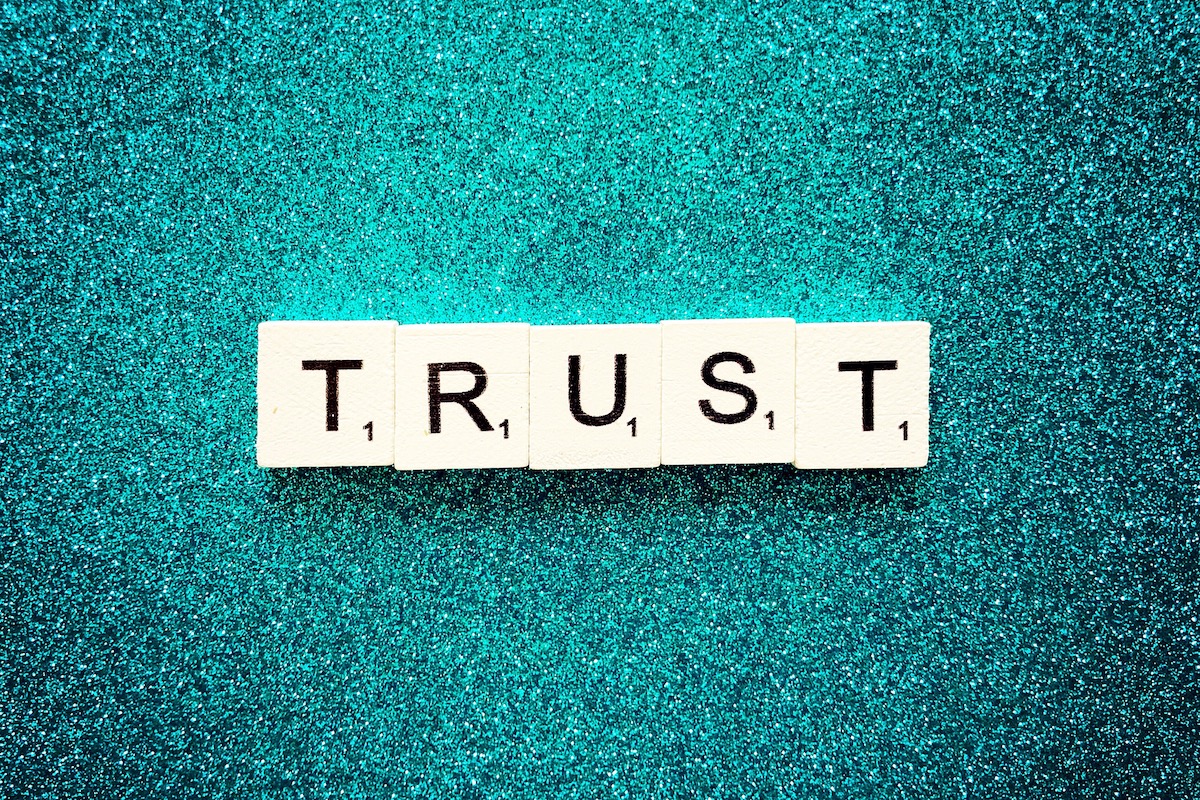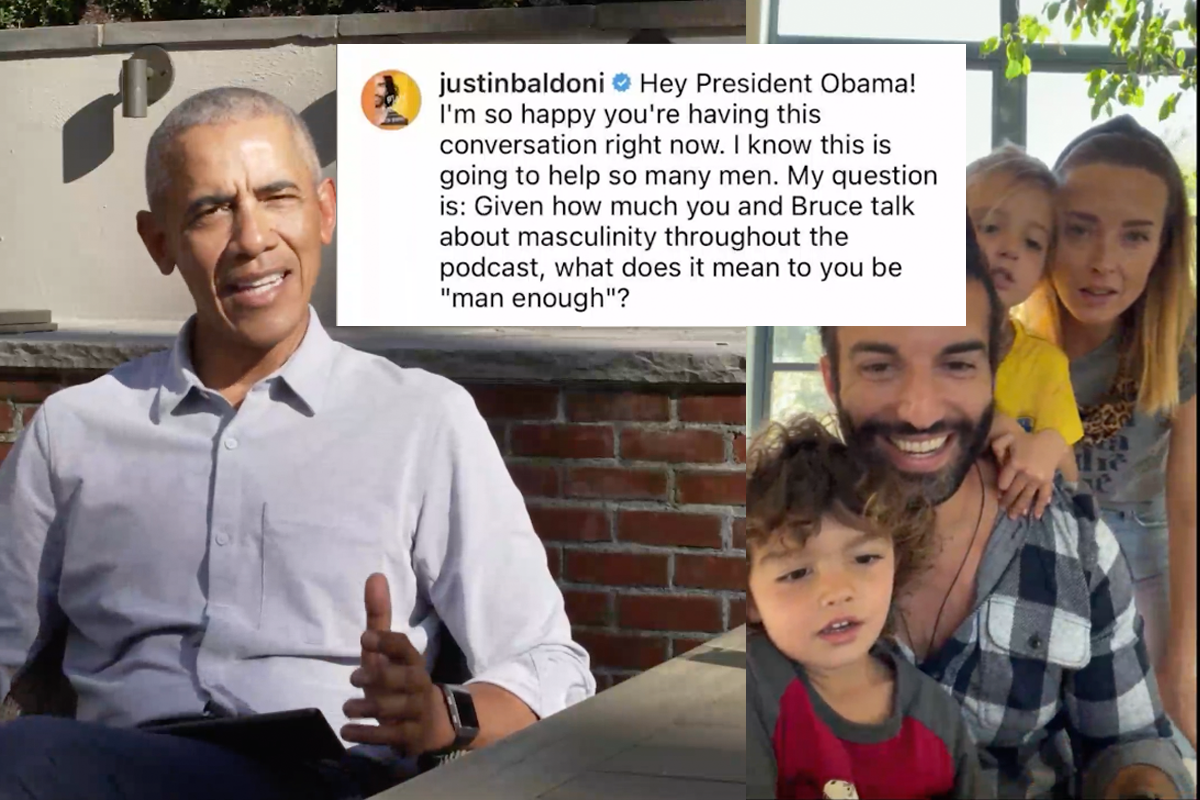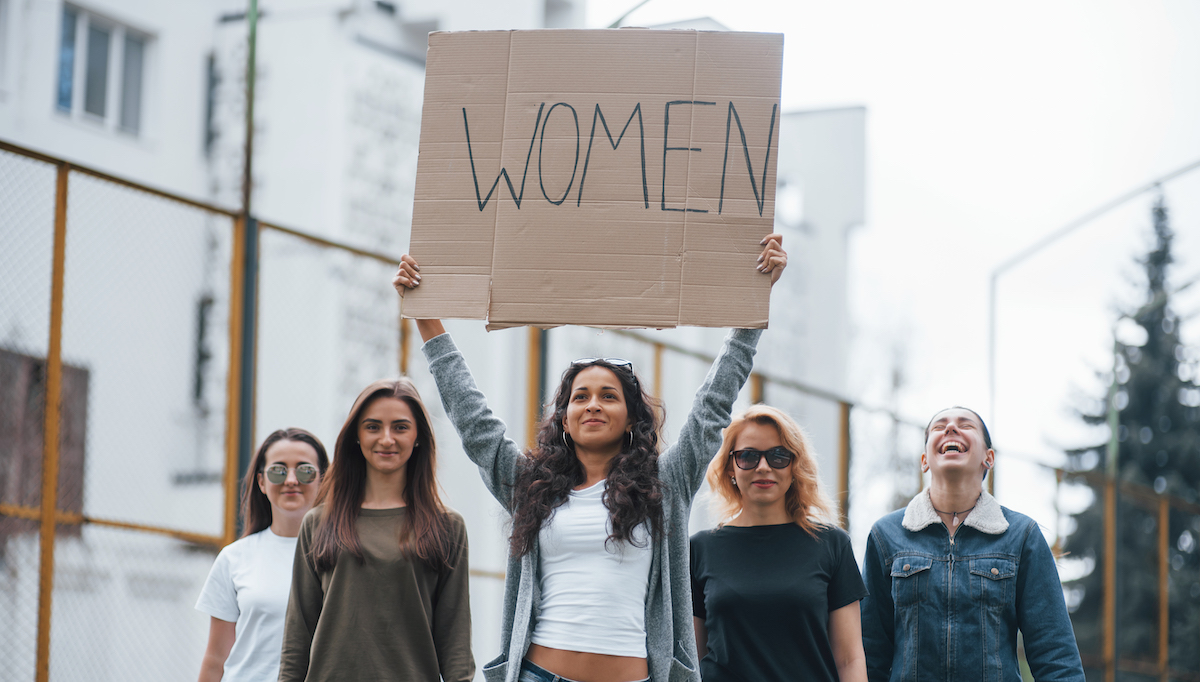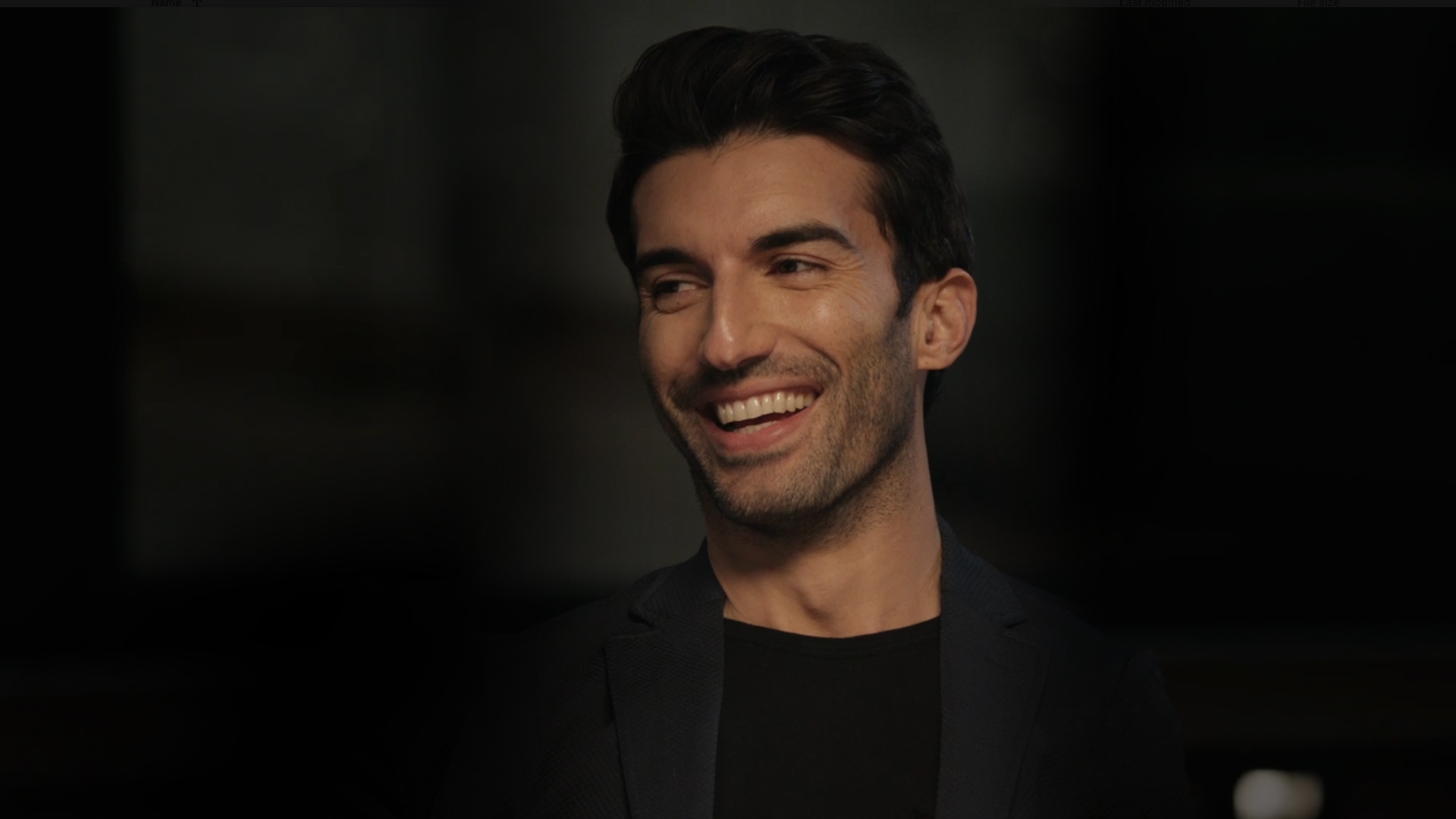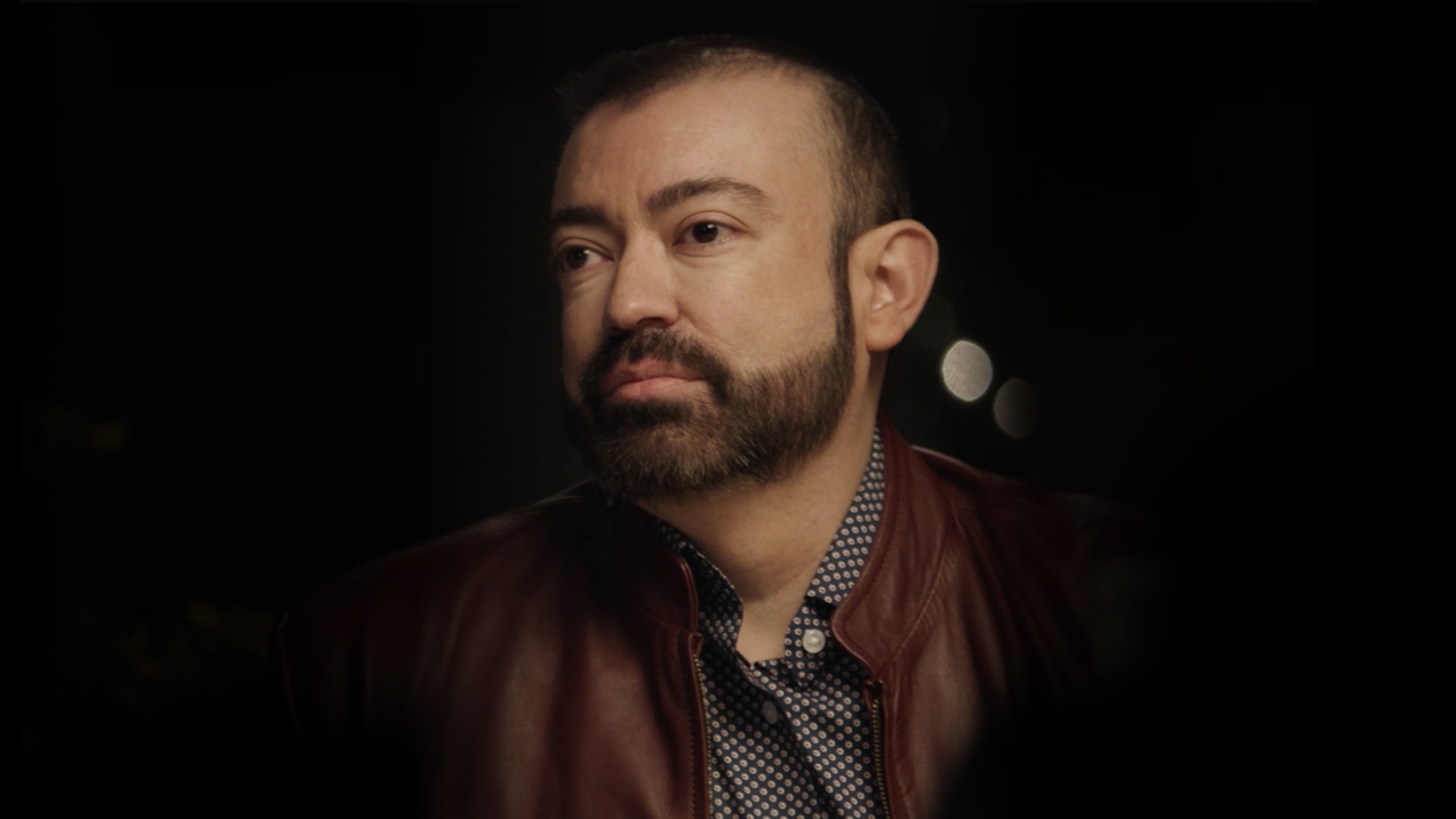Jason Rogers is an Olympic Medalist, LA-based writer, and the creator of The Mandate Letter, a popular newsletter about modern masculinity.
Continue readingWhat it means to be “Dad Enough”
Three voices in the fatherhood community reflect on the challenges of being a modern dad.
Continue readingThe Road to Man Enough: A Movement to Undefine Masculinity
Every road has its potholes, its twists and turns, and every journey has its feelings of elation and its moments of hopelessness. The road to building Man Enough has been this type of dynamic journey, a movement founded on the belief that by undefining traditional roles and traits of masculinity, men will be able to realize their potential as humans and their capacity for connection.
Continue readingAre You Man Enough to Be Trustworthy To Anyone and Everyone?
As a man, it can be frustrating, even infuriating, to be lumped in with the rest of the “usual suspects” after we do something with perfect intention. But with good reason — men don’t exactly have a lengthy track record for doing kind things, pure of heart. When it comes to motive, people often assume the worst.
So what’s in it for you? they’re thinking, eyes squinted in skepticism.
More often than not, we see men in the media who do good things for the wrong reasons, or at best, doing something helpful to society that somehow leads to personal gain. Brands whose own ads are built purely around showing consumers that they’re the “good guys” so you’ll buy their car instead of the other guy’s. A lot of the times when men do something seemingly pure of ulterior motive, the knee-jerk reaction for anyone is suspicion. Not to be trusted, and rightfully so.
Let’s put the shoe on the other foot. When you see someone, especially a person of privilege, go out of their way to help someone and you can’t find a single attachable reason other than human decency, tell us you’re not thrown for a loop like we are, especially in our social media-driven age of record-first, help-later responses.
So how do we, as men, rid ourselves of this suspicion? Frequency and universality.
Man Enough to Care
By that, we mean tipping the scale from uncommon acts of kindness to regular, recurring activities. Little things like holding the door open for someone — we’ll hold a door for someone 100 yards away, we love it — or bolder acts like going well out of your way, completely unprovoked, to check in on someone, buy someone flowers who just celebrated a major achievement, send meals to a distant friend who just had their first kid, anything for anyone who looks like they can use a hand. Or even a simple “hello” to a perfect stranger passing by.
PREORDER JUSTIN BALDONI’S BOOK “UNDEFINING MY MASCULINITY
By universality, we mean don’t just be of service to beautiful women or people you’re attracted to in hopes you will receive something in return. Do things for people who would never expect anything from you, as well. You see an elderly woman carrying her groceries, offer to help. You see a guy stranded on the side of the road, offer directions or the number to AAA. Become the universal friend, someone who is ready, willing and nonjudgmental for everyone they see.
Do it often, give to everyone and suddenly the trust wall begins to build, suspicious brows are lowered and we become a community that heals itself. After the year we’ve had, being of service should be something we jump into oncoming traffic to have the chance to do (don’t jump into oncoming traffic).
Leading By Example
Acts of kindness are the biggest dopamine hit, so even if you truly are being pure of motive, there’s always going to be a major plus in it. The point is to get to a place where kindness is second nature and worrying about motive falls into the rearview. By providing a good example to our sons and daughters, we free our boys of the scripts that say things like motive has to be tied to kindness, allowing them to be trustworthy. And we protect our daughters in the process, allowing them to trust more.
To see them pass that on to someone else later, well, that’s a thing of beauty. That’s the ultimate act of kindness, something that continues on and on, down through generations.
In the past, I’ve told the story about how I once saw a homeless man trying to get his cart of belongings up a curb, only to watch it tumble over. All I could do was watch, sitting there motionless with my morning coffee like an absolute pud. Historically — OK, once — reaching out to help the homeless with their belongings hasn’t fared well for me so I just continued to stare while a man, younger than me, went out of his way to help. I was so embarrassed by myself and yet proud of the young man for embarrassing me.
Ever since seeing that act of kindness, there is no hesitation from me. It’s worth it to put yourself out there for others.
Now, if your knee-jerk reaction to that is “so what,” then we both have work to do. We should all be willing to make the mistake of trying too hard to help, as opposed to not trying enough.
The Challenge
So what will you do this week to be pure of motive and completely trustworthy in the service of others? Look up from the phone and be observant to the world around you. There’s people in need everywhere you look and in so many ways. As we begin to move towards public life again, see where your helping hand, open ear or shoulder to lean on can be useful to others in need.
So what’ll it be, are you man enough to be trusted?
Preorder Justin Baldoni’s debut book, Man Enough: Undefining My Masculinity here.
Join us on Man Enough Facebook and Twitter.
Cover image: Twenty20photos (Envato Elements)
View this post on Instagram
Barack Obama Shares Powerful Message on What ‘Man Enough’ Means to Him
One half of the Renegades: Born in the USA podcast, President Barack Obama has joined the Man Enough movement to discuss what it means to him to be “man enough!”And while not all of us may love the Obama years in the past, most of us can agree on his response about what it means to be a man and a father today.
His “Renegades” podcast with rock ‘n roll legend, Bruce Springsteen, tackles many of the issues related to masculinity and fatherhood in our culture, which is why it felt fitting to ask the former President for a message on being a man and a father today. He even positioned a pint of beer in the video to make it extra relatable!
As men who have experienced troubled or nonexistent relationships with their fathers, the topic of masculinity and the “trick bag” of modern manhood is inevitably at the forefront of their podcast conversations. Naturally, the President had keen thoughts on the journey, responsibility and sacrifices of being a good man and a good father amidst all the stereotypes that come with being a “real man.”
Watch President Obama’s response to Justin Baldoni’s question on what being “man enough” means to him below, then share with us what it means to you on our social!
View this post on Instagram
Preorder Justin Baldoni’s debut book, Man Enough: Undefining My Masculinity here.
Join us on Man Enough Facebook and Twitter.
Cover image: The Washington Post (Getty Images)
Celebrating Women’s History Month With a Roundup of Amazing Women Making History Now
As Women’s History Month comes to a close, it’s become very clear we’ve only scratched the surface of not only great women of history but the many great things women are doing now, enough to keep this celebration going for eternity!
With that in mind, we’re highlighting just a few of the strongest, most inspiring women of the past and of today that continue propelling the world forward. Mothers and daughters, grandmothers and sisters, there isn’t a single woman who doesn’t deserve to be recognized for her greatness and contributions to the world, but these specific women have caught our eyes time and time again.
For the entirety of human existence, women have been held back, held down and even shut out. Whether by male insecurity or fear, jealousy and just the sport of sexism, we have either engaged in or stood by to watch the holding down and shutting out of women, but no more.
Women’s History is a spectacular time to celebrate these countless contributions of women, but it’s also an opportunity, a call to men and people of all genders, to end the holding back and to lift women up where they belong — equals alongside us.
Now it’s your turn to lift up the women closest to you. Lift up all women with a capital W. How will you transform whatever you’ve done in the past that may have held women back, even if unintentionally? How will you help us move forward together? How will you do that not just today but next week and every week from now on?
Celebrate women every chance you get. Make it a daily routine. Make it historical. Make it infectious.
Thanks to Wayfarer Studios [content and research by Ava Bryan + Kate Parkin] for the following slides celebrating women of history and organizations to follow now.
View this post on Instagram
View this post on Instagram
View this post on Instagram
View this post on Instagram
View this post on Instagram
View this post on Instagram
Preorder Justin Baldoni’s debut book, Man Enough: Undefining My Masculinity here.
Join us on Man Enough Facebook and Twitter.
Cover image: mstandret (Envato Elements)
The Great Return to Life: Small Talk Has Never Been Smaller, Come Prepared With Something Real
If you thought the weather was a dull talking point before, that hallway just got a lot more narrow, friend.
Continue readingMan Enough to Care: A Care For All
“Our big vision is Universal Family Care: one fund that we all contribute to and that we all benefit from, that helps us pay for childcare, eldercare, and paid family leave.” -Ai-jen Poo, Director Caring Across Generations
In a country with more than 330 million people, America still manages to be a country without universal long-term care within its healthcare system. It’s quite an achievement, but not a good one.
Caregiving may be the love that comes full circle, but it comes at a steep price. All of us will inevitably need care at a point in our lives, and not all of us can afford it. Average nursing home costs are roughly $90,000 per year.
COVID, while horrible for our health, has managed to shine a light on some of the many inadequacies that surround our healthcare system. Aside from many not having it or being able to afford it, coverage is crap for people who barely can pay the premiums. And Black communities and people of color are at higher risk of illness with a lower risk of being cared for. Look at the disparities during this pandemic, it’s an absolute atrocity. All of that has to change, and soon.
Caring Across Generations is pushing for that “big vision” with systemic change called Universal Family Care, the idea that we all have a fund we contribute to that eventually we can draw from, whether it’s for a disability, child care, elder care and paid family leave. This conversation, Man Enough to Care, is the first step, along with the conversations happening alongside it at your dinner tables, at your hospitals and nursing homes, even as we say goodbye to people who could have been saved, had it been for better healthcare.
Additionally, we must increase the visibility of our healthcare workforce, especially now with all the frontline essential workers who put their lives at risk every day to help countless strangers through this pandemic. And when that’s over they’ll return to a regular life of just saving lives and caring for several people anyway. That’s not just an essential worker; that’s a miracle-worker!
As National Caregivers Day approaches on Friday, Feb. 19, we think about all those who have cared for us and will care for us, along with those we care for. Our fathers and mothers, our sisters and brother, sons and daughters, grandparents, friends, and strangers. It is through caring that it becomes abundantly clear, we are all one, and together we can make it better.
The woman who owns my house is also a nurse in San Bernardino, California. She’s lost more than 20 patients, but she refuses to let these people die alone. That is an every-day saint walking amongst us, so it’s no surprise we don’t bother her when there’s a leak in the john. These people have their own lives and they spend most of theirs looking after other people, despite having three kids of her own!
It’s true that when one part of the body is sick, we nurture it back to health, just as when one of us is sick, another must step up to help heal that person. It may be thankless, and it may be unrequited, but it’s the care that we need. Let us highlight those undervalued roles in our lives and celebrate the people who have, currently or will care for us, even if just for a day.
As you look down at the diapers you’re changing every day for your kids — we hope you make it out clean! — keep in mind they may have to return the favor for you one awkward day. Now that is the truly the love that comes full circle!
The conversation is happening now. Join us to make these policies and systemic solutions to become real.
Join Justin Baldoni, Ai-jen Poo of Caring Across Generations and our wonderful guests for a final wrap-up Instagram live conversation on National Caregivers Day, which is Friday, Feb. 19 at noon PST/3pm EST. Visit @JustinBaldoni on Instagram and get in the game!
“It’s game time. Whatever obstacle you’re facing, it’s time to get off the sidelines and get in the game.” -Devon Still
Be man enough to care. Get in the game. Before it’s too late.
WATCH EPISODE 5: CARE FOR ALL HERE.
Who is a male caregiver in your life? Are you one of them? How do we celebrate them, how do we honor them? We share their experiences.
Share their story. Share your story. Courage is contagious.
For more information about Caring Across Generations, visit their website and follow them on social.
Embracing Vulnerability
“As somebody who [has experience with] a disability, I never got the focus of masculine energy…because I needed help my entire life and depended on other people to do things for me. I felt like a burden on my family.” – Zach Anner
Vulnerability. It’s that six-syllable word (confirm quietly on my fingers) that makes most men a bit squeamish. To embrace vulnerability, for a lot of us, means admitting you’re weak when you could just pretend to be strong and continue fitting in, even if disingenuously. It means expressing emotions that may invite your peers to bully you back. It’s taking the road less traveled, which at first feels good but inevitably will throw you some unexpected curves and may send you into the bushes while the rest of mankind parades by pointing and laughing.
Sound about right? Yeah, we’re definitely getting warmer.
Not all of us have the luxury of taking care of ourselves. Even now with all this technology at our fingertips, there are plenty of grown men out there who still require assistance or have needed it for a generous portion at some point in their lives.
Take comedian and author, Zach Anner, for example. Easily one of the funniest human beings on the planet, Zach required a lot of care growing up due to his cerebral palsy. Although Zach has no interest in being the poster-boy for all special-needs people, we invited him to share his experience as someone who embraced the fact that he needed help.
“There’s this thing you learn…I’m taking so much from other people. What can I do to level the playing field? Which is faulty thinking, but it’s hard to get past that,” Zach said.
Zach not only accepts the importance of vulnerability and asking for help, but he’s also always willing and able to find the comedy in these moments, completely fearless about making himself the butt of any joke. Needing and receiving care isn’t some obstacle to overcome; it’s a part of his life, and you can tell he wouldn’t hesitate to be the first to buy everyone coffee to return the favor.
Personally, I can relate. My oldest friend in this world also has cerebral palsy. When we were kids playing Kick the Can in the yard or roller hockey in the street — yes, we made him the goalie, sadly — he would fall down, and every time I went to help him up, he would refuse. He wanted to do it on his own. He wanted to be like everyone else and fit in, even if somewhat disingenuously. There’s nothing wrong with wanting that, but the ability to say “I need help, can someone help me?” is such an incredible step for any man (or anyone, for that matter) to take. That’s what it means, at least to me, to be man enough.
“As men, we’re taught to solve and to be intellectual and make sense of things. And so when a health situation surfaces that actually requires an emotional approach, not a rational approach, we feel like failures.” – Robert Espinoza
Not too dissimilarly, Devon Still’s daughter felt like all the arguments and sacrifices that followed her cancer diagnosis were her fault. Luckily, Devon understands the importance of communicating and empathizing in these situations.
The guilt of altering another person or group of people’s lifestyles is another burden on top of an illness or disability that takes its own toll, not just physically but emotionally exhaustive, too. With the current lack of support for the caring community, along with a substandard healthcare system that doesn’t benefit many of the people who need it most, that additional weight often falls on family and close friends — sometimes perfect strangers — to address those ancillary issues that arise during the caring process.
Thinking that problems can be solved intellectually, or even at all, is its own issue, one that requires us to better process emotionally and understand it, rather than how we can fix it. As caregivers, especially men who care for others, we have to fight that urge we have to fix everything, rather we need to be present and understand the situation and how we can help in our own way.
I know, it sounds insane to not just fix it, but not everything has a solution, no matter how big your toolbox is.
Being a shoulder for someone, providing comfort and staying present with people who suffer is sometimes exactly what they need. To be vulnerable, to accept care when we need it and to give it when we see someone who needs us. That’s why we’re here: to build community, to start conversations, to begin the changes we need for our loved ones and, most likely, for ourselves in the future.
The system that is in place now, one which is meant to support these people and those they care for, really needs to take notice. Maybe then that guilt and extra strain won’t as easily follow us around.
Who in your life embraces vulnerability? Are any of them giving or receiving care? How do we celebrate them, how do we recognize them? We share their stories.
WATCH MAN ENOUGH TO CARE, EPISODE 4: EMBRACING VULNERABILITY HERE.
Share their story. Share your story. Courage is contagious.
For more information about Caring Across Generations, visit their website and follow them on social.
The Cost of Care
“We are one of the only countries in the world that doesn’t offer paid family & medical leave to those who need it.” – Robert Espinoza
What would you give to help someone you love who is struggling or sick? What wouldn’t you give? That’s the likely perspective of many Americans who have little choice but to go head-first deep into debt to try and save a loved one. There is no guarantee in such a pursuit, other than the cost of care that comes later. With roughly 260 percent higher bankruptcy rates for families battling cancer, it’s becoming clear that not only is the cost of caring oftentimes insurmountable, but it’s also more essential than ever that we mend a broken system, too.
Cancer is, simply put, a cancer. It will likely creep its way into our lives one way or another — bleak but true — if it hasn’t already, be it ourselves or someone we hold dear. But that’s just the tip of the iceberg. There are any number of possibilities for poor health in a country with more than 300 million people who are underinsured, if at all, many of whom struggle with heart disease, obesity and certain hereditary afflictions. That’s not even counting mental illness, another phenomenon we are just starting to scratch the surface of.
Think about it: If that many people are affected by major diseases, many incurable and most requiring great deals of maintenance, then why is the system set in place making it so hard for anyone, middle class or making less (i.e. most of America), who is affected?
Families are losing everything to save their everything. -Devon Still, Former NFL star
A perfect (and terrible) example of how broken our system is may be hitting close to home right now for so many Americans. COVID-19 has upended lives, forced families to lose members and do so without proper goodbyes. Without even going into the mental and emotional scarring, consider the costs due to hospitals and pharmacies that are mathematically just not repayable. And yet, many American leaders have told us that COVID was not a serious illness but then were immediately given the best possible treatment for COVID after irresponsibly contracting the disease and simultaneously trying to take away what American healthcare we do have. Their treatment, in part, was paid for by the taxes of the people they lied to, and then they leave those same people neck-deep in debt for the exact same affliction. That is the very definition of madness.
“People have always worked and have always had families. But we’ve somehow never accounted for the fact that people have to do both at the same time, and put the infrastructure in place to support that.” – Ai-jen Poo, Director of Caring Across Generations
For Former NFL star, Devon Still, he knew when his little girl was diagnosed with cancer, there would have to be a sacrifice made. For him, without hesitation, that meant giving up everything he had achieved to be with her.
Historically, we know countless women have graciously done the same for their families simply by way of childbirth, many of which are not given proper maternity leave or help for their families. But now we’re realizing men, too, fall into this category, roughly 40 percent of caregivers in America, a country with nearly 70 percent of households with kids having both parents working outside of the house. Where would be without caregivers!?
Luckily for Devon and his family, the players’ union helped financially with his daughter’s treatment, and we’re thrilled to report last spring, she hit her 5-year milestone of being cancer-free, a truly fantastic moment! But for so many people, they don’t get to see the amount on medical bills they owe being discounted by insurance and other workplace coverage. That’s with them for life and will forever affect the way they live and spend and care for one another moving forward.
That’s why caregivers are so important. They not only help soften the blow of a major illness, they’re also sacrificing themselves — physically, mentally, emotionally. There can be a lot of happy moments that do come from an experience caring for a loved one, memories we should never forget, but there doesn’t need to be the sour aftertaste of massive debt hanging over anyone once it’s over, for better or worse.
Individual issues require collective action and collective solutions, especially when millions of individuals are affected.
So how do we change the system? We write to our congressmen and women, we vote for people who genuinely want to make a change — state and federal — and we take this awareness and begin having conversations that focus on finding solutions. And we support those who support others.
Who is a male caregiver in your life? Are you one of them? How do we celebrate them, how do we recognize them? We share their stories.
Share their story. Share your story. Courage is contagious.
Join the conversation and take action to create a more caring future here.
For more information about Caring Across Generations, visit their website and follow them on social.
